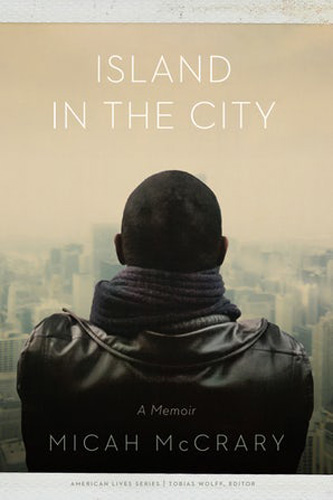Island in the City
Island in the City: A Memoir is composed of a series of interrelated essays about identity by Micah McCrary. These essays interrogate what it means to be black, queer, and middle-class, even as they question the stability and meaning of those categories themselves.
Island in the City: A Memoir is composed of a series of interrelated essays about identity by Micah McCrary. These essays interrogate what it means to be black, queer, and middle-class, even as they question the stability and meaning of those categories themselves.
What the essays discover, at least in part, is that McCrary finds his most enduring sense of self and purpose not in easily fitting into one category or another, but in the process of exploration. He’s a traveler, in short, who values the journey more than any particular destination.
At the same time, perhaps ironically, McCrary searches for a sense of home and settledness in these essays. He wants, he suggests, to arrive somewhere—though he’s still figuring out where that place might be and who he might be as an inhabitant of it.
The collection is divided into sections organized around three cities that he, at various points in his life, has called home. The first section is about his hometown of Normal, Illinois, where he grew up in a comfortable, suburban home in a predominantly white community surrounded by farmland and woods.
The first essay, “Oreo,” examines McCrary’s sense of racial identity and the ways that he’s uneasy identifying wholly with how the culture defines him: “I’m not writing about a or the black experience—I’m not writing as a black man. Please remove me from the discourse, because I don’t represent anyone but myself.”
At the same time, however, he’s acutely aware of the ways the culture’s definitions and perceptions of race inevitably shape his experiences and his sense of identity. An exploration of the confusing and contradictory intersections between personal and cultural identity, in fact, forms the heart of these essays.
The idea of coming from this “normal” place is one of the book’s guiding narratives, insofar that it gives McCrary a place from which he understands and interprets everything he experiences. There’s a sense of irony in the name of this town as well since, as he discovers, the normality of his hometown differs wildly from other normalities he encounters.
The second section of the book is devoted to Chicago and McCrary’s experiences there as a college student and young adult. In Chicago, he first starts to understand what it means to be independent, financially and otherwise, and he also discovers the ways he does and does not fit into this city.
Ultimately, he learns that the city itself does not have one identity, but rather multiple ones, based on the ever-evolving interactions of race, ethnicity, class, and other identities. He also begins to understand that his perceptions of the city are shaped both by who he is and who he is perceived to be. The city shifts underneath his feet, and he finds that he can’t use it as a reliable measure of his own sense of stability, sanity, or identity.
The collection’s final section is about Prague, where McCrary studies both as an undergraduate and later as a graduate student. In Prague, he discovers the ways that he both is and isn’t American, and he also comes to understand that he most likely cannot find his home there.
McCrary would like to assimilate into Czech culture, but over time he realizes that this assimilation might, in the end, be impossible. He’ll always be American, and he’ll always bring with him his particular set of American assumptions and privileges. No matter how much he’d like to settle there, he understands he most likely cannot.
As he says at the end of an essay called “An Idea of Prague”:
I thought then that maybe I never wanted to return here in winter. That, maybe, I was too used to the comfort of American warmth to let myself really absorb all of this, and that I was too afraid to return there another winter at the risk of ever hating this place.
He’d like Prague to remain as a place of pure possibility, in other words, but it keeps insisting on getting mired in the muddy realities of late capitalism and class.
Ultimately, the longing for home and the desire for a more settled existence create a narrative thread tying all these essays together. As McCrary says:
I want to be in a place where I can work with all my heart and where I can work for a very long time. This, to me, is settling: Finding a place to seat myself where I won’t feel restless or antsy, but where I’ll still feel determined.
This, then, is the dream of the book: to develop a sense of identity and home that does not sacrifice the joy and pleasure to be found in searching.





